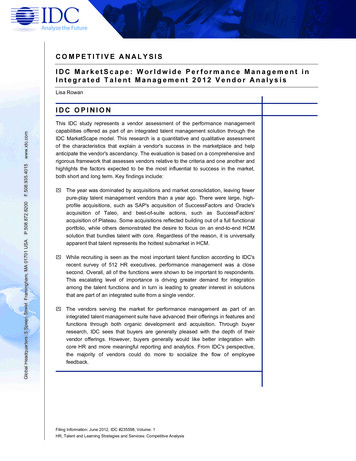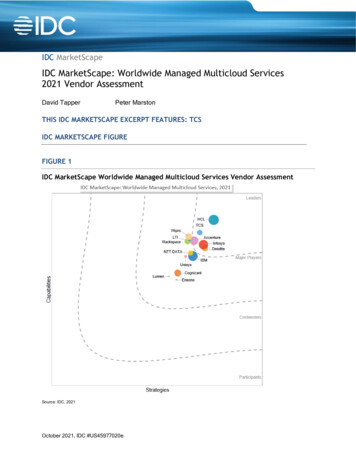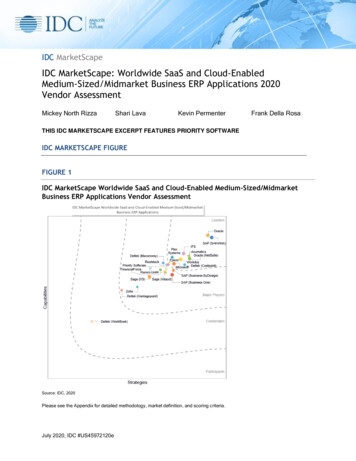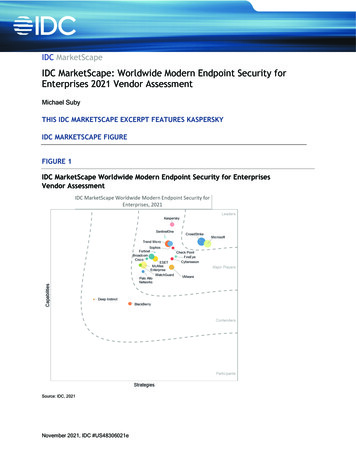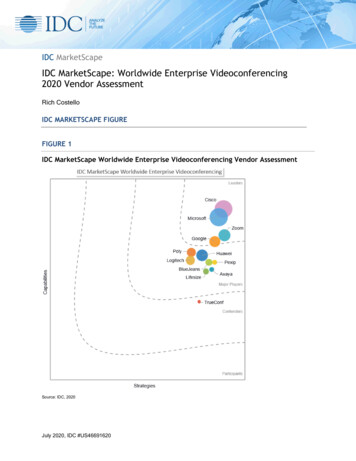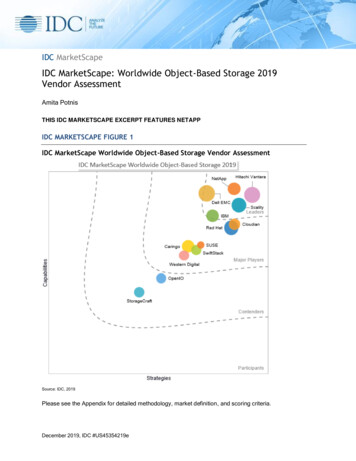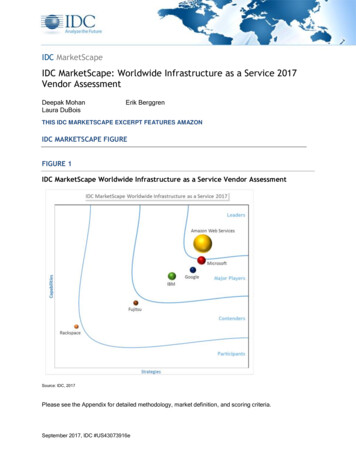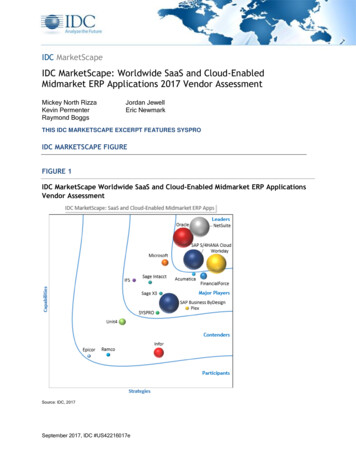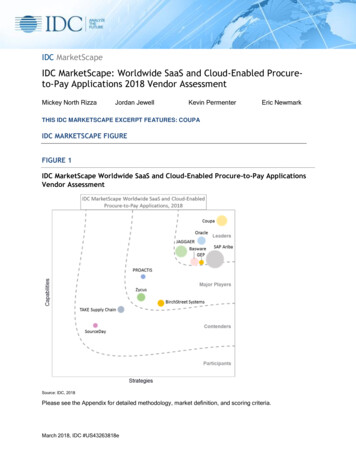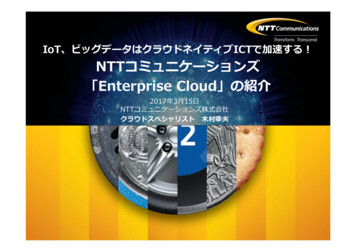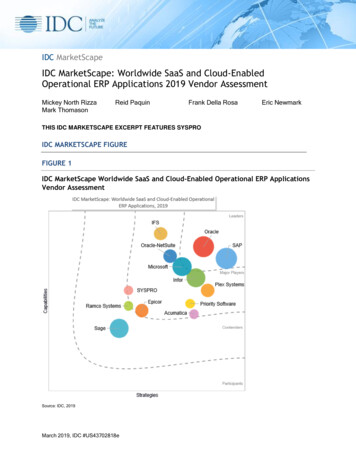
Transcription
IDC MarketScapeIDC MarketScape: Worldwide SaaS and Cloud-EnabledOperational ERP Applications 2019 Vendor AssessmentMickey North RizzaMark ThomasonReid PaquinFrank Della RosaEric NewmarkTHIS IDC MARKETSCAPE EXCERPT FEATURES SYSPROIDC MARKETSCAPE FIGUREFIGURE 1IDC MarketScape Worldwide SaaS and Cloud-Enabled Operational ERP ApplicationsVendor AssessmentSource: IDC, 2019March 2019, IDC #US43702818e
Please see the Appendix for detailed methodology, market definition, and scoring criteria.IN THIS EXCERPTThe content for this excerpt was taken directly from IDC MarketScape: Worldwide SaaS and CloudEnabled Operational ERP Applications 2019 Vendor Assessment (Doc # US43702818). All or parts ofthe following sections are included in this excerpt: IDC Opinion, IDC MarketScape Vendor InclusionCriteria, Essential Guidance, Vendor Summary Profile, Appendix and Learn More. Also included isFigure 1.IDC OPINIONDigital Transformation Driving ChangeDigital transformation (DX) is fundamentally changing enterprise resource planning (ERP) applications— allowing businesses to transform their decision making, which is enhancing their business outcomessignificantly in the digital economy. Digital transformation is an enterprisewide, board-level strategicreality for companies wishing to remain relevant or maintain or enhance their leadership position in thedigital economy. Digitally transformed businesses have a repeatable set of practices and disciplinesused to leverage new businesses, 3rd Platform technologies, and operating models to disruptbusinesses, customers, and markets in pursuit of business performance and growth. DX is drivingbusinesses to rethink their technology strategy, and that includes moving beyond their legacy ERP andback-office systems.SaaS and Cloud-Enabled Software Driving InvestmentInstead of continuing to invest in antiquated on-premises systems, smart DX businesses have turnedtheir focus to SaaS and cloud-enabled software because they need flexible and agile financialapplications that are relatively easy to implement, configure, and update. Demand for cloud-basedERP applications continues to grow because of the ability to access and analyze massive amounts ofdata in near real time. With speed as a guiding factor to winning business globally, businesses wantand need more from their ERP systems than ever before, and that includes using the most up-to-dateand advanced systems found in SaaS and cloud-enabled ERP systems. SaaS and cloud-enabled ERPsystems enable growing businesses to quickly expand into new regions around the globe withoutmaking major investments into their technology infrastructure because they are extremely adaptive toaccelerated rates of change. SaaS and cloud-enabled systems are adaptive to dynamic operationsenvironments, which is why this IDC MarketScape for SaaS and cloud-enabled operational ERPapplications is extremely important as a technology vendor guide for today's COO, CFO, CIO, and ITbuyer.Operational ERPOperational ERP includes product-centric organizations in industries such as manufacturing,distribution, and retail. These organizations' ERP systems incorporate operational modules, includingorder management, finance, procurement, enterprise asset management (EAM), manufacturing, andsupply chain, to maximize operational efficiencies. These organizations see benefits from theintegration between core finance and operational capabilities so that operational transactions with afinancial impact are reflected directly in financial modules. In today's fast-paced global businessenvironment, successfully managing the operation's processes to meet the organization's financial 2019 IDC#US43702818e2
obligations is essential. Moreover, as the digital economy continues to develop the organization, thefinance, manufacturing, supply chain, sales, and asset management functions will play a largerforward-facing role — interacting with clients and customers. The operations of an organization can becomplex and fraught with inefficiencies for companies of all sizes. During our interactions with finance,various operations, and IT professionals, the following issues were top of mind: Key metrics: Productivity improvements from shop floor to supply chain to enterprise end-toend business processes were critical. In addition, inventory accuracy, booked versus billingratios, and customer on-time deliveries were the metrics mentioned the most in the operationalERP systems tract. Manual processes: Today, there are still thousands of companies of all sizes with manymanual workflows. As a result, the operational and financial processes used to run thebusiness become exceedingly inefficient — consuming precious resources and returningdelayed approvals, with a multitude of errors. Moreover, manually driven processes withinoperations can lead to inflexibility and a lack of agility, which can be extremely harmful to acompany's ability to maneuver in the increasingly dynamic digital economy. Visibility issues: Operations and finance executives do not have time to retrace their steps inan effort to find lost transactions and errors and/or verify previous transactions. This leads tooperational resources spending extra time looking backward instead of at current informationand modeling it for the future for the best possible outcomes. Resource constraints: In many growing companies, operations professionals are being askedto do more with less, and in many cases, legacy systems add to the workload instead ofreducing it. In the age of digital, employees need to rely on their technology systems to domore so they can spend more time modeling, predicting the future, and bringing betterbusiness outcomes. Lost money: Companies with inefficient operational and financial processes not only risk doingdamage to their reputations, but they also often lose opportunities to take advantage of earlypayment discounts, cost savings, and efficient processes.Operational workflows are quickly changing as part of digital transformation initiatives. This shift bringsforth a new chapter in the evolving story of operational ERP applications. The new chapter withinoperational ERP software applications will be characterized by the following: Robots: Robotic process automation (RPA) is another technological tool that is driving thedigital transformation for business workflows. With RPA, employees will be better able to copewith the demands of forecasting, error reconciliation, approval/exception resolution, and datareporting. Rise of machine learning (ML): Recently, companies have turned to structured machinelearning to speedup/streamline key financial processes such as matching, invoicereconciliation, transaction processing, and compliance. In addition, early adopters of machinelearning have been able to eliminate a large amount of time spent on manual tasks while alsodecreasing the error rate of these same tasks. Embedded intelligence: Roughly 80% of today's operations' professional time is spent onlower-level tasks like manual matching of receipts, invoices, purchase order, and inventorytagging. Artificial intelligence (AI) is being used to automate many of these lower-level tasks —freeing up valuable organizational resources to focus on higher-level strategic tasks. 2019 IDC#US43702818e3
The goal of this document is to provide potential software customers with a list of operational ERPsoftware companies that have taken great strides to address the challenges listed previously. We haveprofiled and assessed their capabilities to support the complicated area of operational ERP.IDC MARKETSCAPE VENDOR INCLUSION CRITERIAThrough its clients and contacts across most industries, IDC frequently has unique visibility into vendorselection processes within many companies. The vendor inclusion list for this document began withthose SaaS and cloud-enabled operational ERP solutions that IDC was familiar with having beenevaluated for selection within recent operational ERP deals. IDC then supplemented those solutionswith several additional ERP vendors that it believed also provided qualifying operational ERP systems.Vendors were then surveyed and further investigated to ensure that their operational ERP systemsqualified as SaaS or cloud enabled and were already serving clients. Ultimately, all operational ERPsolutions included in this document met these criteria.After an initial evaluation of software vendors serving this market, which included each vendor's highlevel application capabilities and existing operational ERP client base, IDC's Enterprise Applicationsteam extended formal invitations to software vendors to participate in our study.All vendors actively participated in the research, with a total of 42 references contacted andinterviewed. Discussions with references included the systems utilized and their perception of thevendor and software in terms of technical support, account management, marketing message, level ofvalue delivered versus price paid, ease of integration, user interface (UI), innovation, intelligentworkflows, and ROI. In addition, references also provided information on the areas of technologyimprovement they would like to see from the vendor, their future business requirements, and their top3 metrics.ADVICE FOR TECHNOLOGY BUYERSSaaS and cloud-enabled operational ERP technology is evolving with functionality improvementsoccurring as often as daily. From the addition of the 3rd Platform with Big Data and analytics, social,and mobile to the innovation accelerators of cognitive, 3D printing, robotics, Internet of Things (IoT),and advanced security, the systems continue to advance and improve at warp speed. Speed is thecritical factor as in the digital economy, enabling businesses to significantly improve in terms of marketshare, revenue, and profitability. It is recommended that companies understand the current capabilitiesof their technology choices, along with the strategic direction and investment their operational ERPsoftware provider is making now and in the next three to five years. A guiding factor in our vendorresearch was the 3rd Platform and innovation accelerators' current capabilities and their strategic andinvestment direction. It is critical that buyers look for a technology partner they can trust and that cantake them well into the future.As SaaS and cloud-enabled operational ERP systems have increased in popularity, so too has therequirement for companies to utilize an ERP system regardless of their business size. Largeenterprises find operational ERP systems enable visibility across the entire organization fromcustomers through to suppliers. But just as important are small and midsize organizations usingoperational ERP systems. Many large enterprise CFOs and CIOs move to small and medium-sizedbusiness (SMB) and need an ERP package they are accustomed to but at a fraction of the cost. Theexecutives of small and midsize organizations want to move beyond spreadsheets and databases to 2019 IDC#US43702818e4
SaaS and cloud-enabled operational ERP software because it is an integrated, real-time businesssystem that is always accessible and grows with the business. Last, organizations vary in products andrequire innovation to move beyond the current state into the intelligent enterprise world. SaaS andcloud-enabled operational ERP systems are the critical core to build intelligent systems, which usemachine learning and natural language processing (NLP) on curated data sets, with advancedanalytics and an assistive user interface across the resources of people, process, and technology.These intelligent ERP (i-ERP) systems forecast, track, learn, route, analyze, predict, report, andmanage business decisions and outcomes. Many of the vendors in this IDC MarketScape havealready invested in the 3rd Platform and innovation accelerators, utilizing these innovation areas todeliver higher value to their customers, while others are just beginning this investment journey. Severalvendors outlined in this research study have more operational depth and breadth in manufacturing andsupply chain. And some are still moving from on-premises to single tenancy and just beginning theirjourney toward multitenancy. Before making purchasing decisions on SaaS and cloud-enabledoperational ERP software, businesses should consider: Does the vendor have experience with my type of product, company size, and operation'srequirements? Is the vendor knowledgeable about operational ERP requirements as they affect my companyand industry? Does the vendor understand the regulations that will impact my business? How are theseregulations reflected in my current technology, and how will it change in the future? What levels of support are available, and are they geographically available for my business? What are my internal support resources and capabilities? Should I hire a third party to plan and assist with the implementation of the operational ERPsolution? Is the vendor financially able to provide needed support? Can the vendor support neededinvestment in the development of future operational ERP software requirements? Is the vendor committed to this market for the long term? Is the ROI achievable? Does the vendor have a track record of meeting the ROI requirements? Can the vendor or partners support my foreign operations? Can the vendor integrate with my company's other IT systems and those of my partners? Is the product available anywhere and anytime? Is the product updated frequently enough for my business needs? What new innovations is the vendor considering, investing, and tied to with its road map? Howand when will it impact my business? What is the vendor's strategic investment outlook for the next three to five years? Why? Will the vendor be a partner, helping my business grow now and in the long term?This IDC MarketScape vendor assessment assists in answering these questions and others. Some ofthe references that participated in this study noted that the current state of the SaaS and cloudenabled operational ERP software market is evolving. In addition, many of the references wereimpressed that there are now more vendor choices within the operational ERP market. IDC expectsthat some consolidation and specialization by niche may occur as the market matures and asoperational ERP software vendors look to add additional capabilities to their portfolio of products. 2019 IDC#US43702818e5
VENDOR SUMMARY PROFILESThis section briefly explains IDC's key observations resulting in a vendor's position in the IDCMarketScape. While every vendor is evaluated against each of the criteria outlined in the Appendix,the description here provides a summary of each vendor's strengths and challenges.SYSPROAfter a thorough evaluation of SYSPRO's strategies and capabilities, IDC has positioned the companyin the Major Players category within this 2019 IDC MarketScape for worldwide SaaS and cloudenabled operational ERP applications.SYSPRO is single-source industry-built, end-to-end ERP system that provides an out-of-the-boxflexible, reliable, customizable, and scalable solution for manufacturing and distribution companies.Quick facts about SYSPRO: Employees: 512 Total number of clients: 15,000 licensed companies Industry focus: Operational ERP covers the general capabilities required for industries thatmanufacture or distribute products. Specifically, SYSPRO specializes in industrial machineryand equipment (IM&C), food and beverage, electronics (EMS and EEAC), fabricated metals,plastics and rubber, packaging, automotive components and accessories, medical devicesand a few other specialist manufacturing and distribution industries. Ideal customer size: Targets midsize businesses (50 to 999 employees) SaaS: SYSPRO has no multitenancy on application, database, or infrastructure layers.SYSPRO Cloud is an infrastructure-as-a-service (IaaS) offering. The IaaS business modeldelivers software through a provider that hosts and manages the software, licenses thesoftware on a subscription basis, and enables users to access the software through theinternet. This delivers business value without requiring any upfront investment and without theoverheads of an in-house IT infrastructure. As an IaaS provider, SYSPRO hosts the customervirtual machine, managing the underlying equipment and getting the storage and otherresources as needed. SYSPRO Cloud is available via the Microsoft Azure "cloud" platform andhosted at datacenters throughout the world. SYSPRO Cloud is a single-tenant application, andeach customer is able to maintain and control the timing of their upgrades. Support forinfrastructure-related issues is provided as part of the monthly subscription. For applicationsupport, customers can elect to sign a support contract with a SYSPRO channel partner or alocal SYSPRO office. Pricing model: License and subscription Largest customer: Largest customers support 200 users Partner ecosystem: 119 partners Interesting stat/fact: SYSPRO process modeling provides a visual representation of acustomer's modeled business processes so that all stakeholders — business, operators, andimplementers — have a single view of the customer's business and planned solution.Strengths Training, support, and automation: A key philosophy and approach to customer service andsupport is to empower customers through knowledge and access to tools to enable them to 2019 IDC#US43702818e6
self-help. This includes SYSPRO Learning Channel (SLC), which provides tutorials — selfpaced online learning and associated role-based certifications. It also includes bots withinapplications that direct users and explain the necessary processes to follow. UI, mobile, and web-based interface: SYSPRO is easy to use, simple to understand, intuitive,engaging, and always available. The focus on user experience means the software isstraightforward and easy to customize for a user's specific role and business process.Espresso, the mobile offering, provides access to manufacturing and business processes anddata on the go. It enables SYSPRO customers to use applications that will work anywhere,anytime, on any popular device, providing instant and secure access to key businessinformation. SYSPRO's web-based interface, Avanti, with its consistent user interface,uniquely gives customers the same SYSPRO ERP user experience through a web browser onany device, without having to learn a different operating system. Social ERP: Recognizing that next-generational users interact with technology (and theirpeers) differently, SYSPRO built in a socially sensitive and aware set of workflow-enableddigital ERP capabilities. These capabilities allow for users to engage with their systems in afamiliar manner as they would in engaging their social media platformsChallenges Perception of cloud: In the sectors of manufacturing and distribution, many senior executivesare still skeptical as to the security and the level of control they will have with cloud ERP. Thiscoupled with the fact that SYSPRO has a significantly smaller footprint often means there is alack of confidence when making the decision to select SYSPRO Cloud. Brand awareness: SYSPRO, while gaining in market presence, is still a relatively unknownentity in EMEA and the United States. More direct marketing, differentiating case studies, andinnovation will bring more clients to SYSPRO. Quality management: SYSPRO's quality management functionality is lean, with much of thefunctionality provided by third-party solutions. SYSPRO is adding more quality managementfunctionality with future releases.Consider SYSPRO WhenConsider SYSPRO ERP if you are a mid- to high-end manufacturer or distributor that is seekingscalable, easy-to-use business transformation on the newest digital technologies and/or if you place ahigh value on industry-specific product depth and a customer-centric culture and want flexible cloud,SaaS, and/or on-premises deployment options.APPENDIXReading an IDC MarketScape GraphFor the purposes of this analysis, IDC divided potential key measures for success into two primarycategories: capabilities and strategies.Positioning on the y-axis reflects the vendor's current capabilities and menu of services and how wellaligned the vendor is to customer needs. The capabilities category focuses on the capabilities of thecompany and product today, here and now. Under this category, IDC analysts will look at how well avendor is building/delivering capabilities that enable it to execute its chosen strategy in the market.Positioning on the x-axis, or strategies axis, indicates how well the vendor's future strategy aligns withwhat customers will require in three to five years. The strategies category focuses on high-level 2019 IDC#US43702818e7
decisions and underlying assumptions about offerings, customer segments, and business and go-tomarket plans for the next three to five years.The size of the individual vendor markers in the IDC MarketScape represents the market share of eachindividual vendor within the specific market segment being assessed.IDC MarketScape MethodologyIDC MarketScape criteria selection, weightings, and vendor scores represent well-researched IDCjudgment about the market and specific vendors. IDC analysts tailor the range of standard characteristicsby which vendors are measured through structured discussions, surveys, and interviews with marketleaders, participants, and end users. Market weightings are based on user interviews, buyer surveys, andthe input of IDC experts in each market. IDC analysts base individual vendor scores, and ultimatelyvendor positions on the IDC MarketScape, on detailed surveys and interviews with the vendors, publiclyavailable information, and end-user experiences in an effort to provide an accurate and consistentassessment of each vendor's characteristics, behavior, and capability.Market DefinitionThis IDC MarketScape evaluation focuses on SaaS and cloud-enabled operational ERP solutions.ERP is a packaged integrated suite of technology business applications with common data andprocess models that digitally support the administrative, financial, and operational business processesacross different industries. These processes manage resources including some or all of the following:people, finances, capital, materials, suppliers, manufacturing, supply chains, customers, products,projects, contracts, orders, and facilities.This IDC MarketScape evaluates ERP technology with an operational slant. The IDC operational ERPdefinition includes product-centric organizations in industries such as manufacturing, distribution, andretail. These organizations' ERP systems incorporate operational modules, including ordermanagement, enterprise asset management (EAM), manufacturing, and supply chain, to maximizeoperational efficiencies. These organizations see benefits from the integration between core financeand operational capabilities so that operational transactions with a financial impact are reflecteddirectly in financial modules.Typically, ERP solutions are architected with an integrated set of business rules and metadata,accessing a common data set (logical or physical) from a single, consistent user interface. OperationalERP solutions are available as on-premises, hybrid and, increasingly, cloud SaaS deployments.The Role of Technology in OperationsTechnology is critically important within operations. From transactions to operations to compliance, tosavings and discounts to inventory management and cash flow, technology is a critical resource for theorganization. Operational ERP touches upon: Purchase orders Customer orders Invoicing Inventory Products Assets 2019 IDC#US43702818e8
Suppliers Payments CustomersLEARN MORERelated Research IDC FutureScape: Worldwide Intelligent ERP 2019 Predictions (IDC #US43262918, October2018) Worldwide Enterprise Resource Planning Software Forecast, 2018-2022: Cloud Leads theWay (IDC #US43265918, July 2018) SaaS and Cloud-Enabled ERP: The Perfect Storm to Move Beyond Legacy ERP andSpreadsheets (IDC #US43703018, March 2018) i-ERP (Intelligent ERP): The New Backbone for Digital Transformation (IDC #US41732516,September 2016)SynopsisThis IDC study provides an assessment of the leading SaaS and cloud-enabled operational ERPsoftware solutions and discusses what criteria are most important for companies to consider whenselecting a system."It is imperative in today's fast-paced global business environment that organizations manage theoperation's processes to meet the organization's financial obligations, and this includes product-centricorganizations relying on operational ERP," states Mickey North Rizza, program VP, EnterpriseApplications and Digital Commerce. "The SaaS and cloud-enabled operational ERP market is a mix ofvendors with varying capabilities. It is critical that organizations select the right technology partner tohelp run the business for the long term." 2019 IDC#US43702818e9
About IDCInternational Data Corporation (IDC) is the premier global provider of market intelligence, advisoryservices, and events for the information technology, telecommunications and consumer technologymarkets. IDC helps IT professionals, business executives, and the investment community make factbased decisions on technology purchases and business strategy. More than 1,100 IDC analystsprovide global, regional, and local expertise on technology and industry opportunities and trends inover 110 countries worldwide. For 50 years, IDC has provided strategic insights to help our clientsachieve their key business objectives. IDC is a subsidiary of IDG, the world's leading technologymedia, research, and events company.Global Headquarters5 Speen StreetFramingham, MA 01701USA508.872.8200Twitter: @IDCidc-community.comwww.idc.comCopyright and Trademark NoticeThis IDC research document was published as part of an IDC continuous intelligence service, providing writtenresearch, analyst interactions, telebriefings, and conferences. Visit www.idc.com to learn more about IDCsubscription and consulting services. To view a list of IDC offices worldwide, visit www.idc.com/offices. Pleasecontact the IDC Hotline at 800.343.4952, ext. 7988 (or 1.508.988.7988) or sales@idc.com for information onapplying the price of this document toward the purchase of an IDC service or for information on additional copiesor web rights. IDC and IDC MarketScape are trademarks of International Data Group, Inc.Copyright 2019 IDC. Reproduction is forbidden unless authorized. All rights reserved.
level application capabilities and existing operational ERP client base, IDC's Enterprise Applications team extended formal invitations to software vendors to participate in our study. All vendors actively participated in the research, with a total of 42 references contacted and interviewed.
